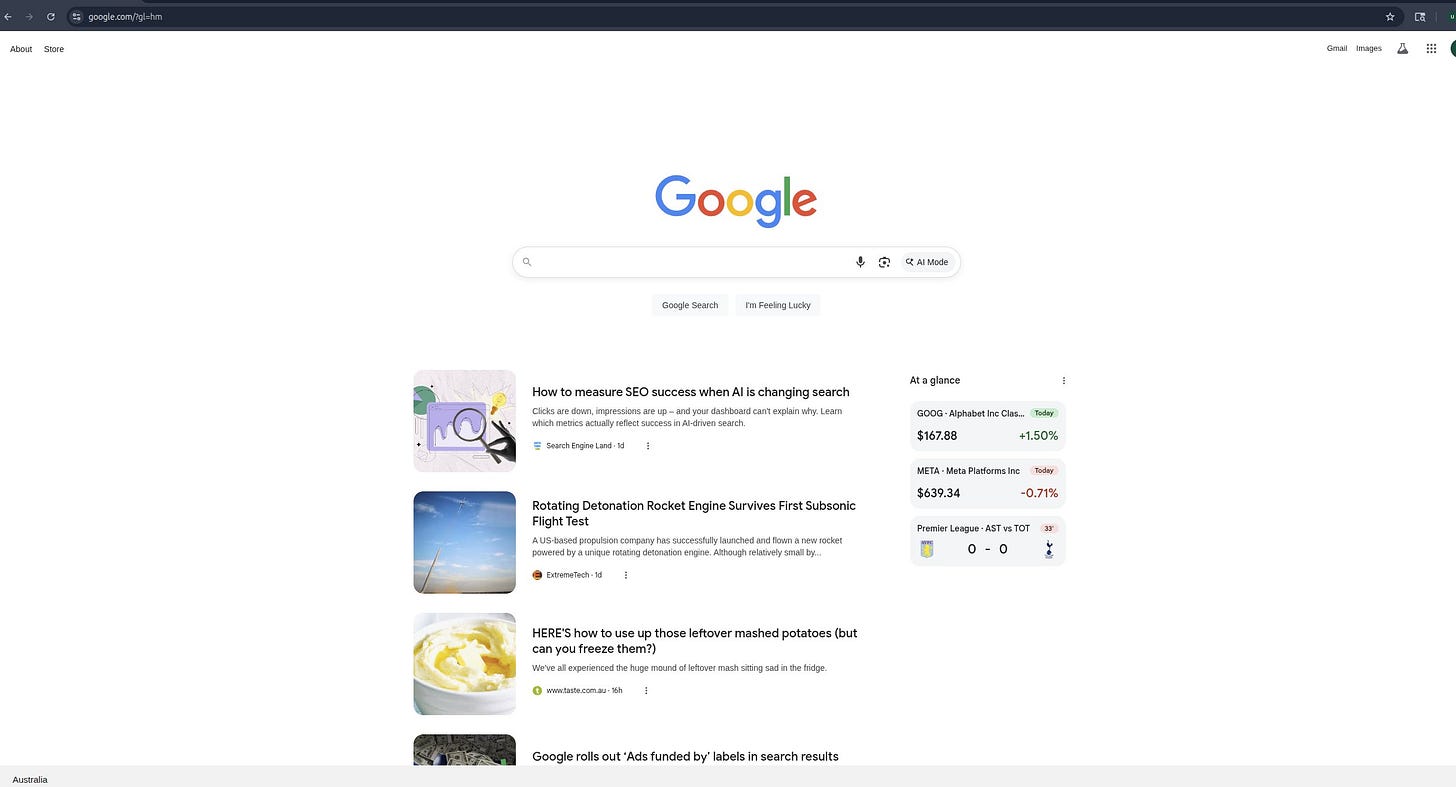Google Discover on desktop appears imminent
Plus: BBC director-general signals stronger linking to local sources + FullFact's custom gen-AI tool helping to police the internet and media
Good afternoon,
And happy Wednesday. This week’s digest is back in the usual format, so sharing three interesting reads which have crossed my feed in the past week or so.
They weave together elements of journalism, digital content and more to hopefully give you some fresh insight and keep abreast of what’s happening in the publishing and media industry right now.
Let’s get into it, starting with something that could be huge…
Google Begins Rolling Out Discover On Desktop - Search Engine Roundtable - this has been widely shared by lots of people as the traffic referral behemoth that is Google Discover, widely available on Android phones and on Google on mobile, is coming to Desktop. Now, given the bulk of audience is on mobile for most publishers you might wonder why there’s so much excitement?
Desktop traffic in terms of pages per visit tends to always be higher than mobile, so the potential marginal gains here are going to be high for some publishers - especially if display/programmatic is a big part of the commercial mix.
I saw the Search Engine Roundtable piece shared by the excellent
in his newsletter where he reflected:And of course once Google opens this traffic floodgate, every traditional media company will start pumping out more and more content that caters to the Discover algorithm, even if that content does nothing to really service the publication's core audience. It'll be a new shiny object in a long line of shiny objects that distracts legacy media outlets from addressing the systemic problems facing their industry.
He echoes some of the arguments made by Barry Adams and others in Autumn last year when I touched on the Google Discover question.
While Simon is right that the gains are most likely for mass production/scale publishers, one thing Discover is very good for is surfacing content based on more niche interests. So for independent or more niche sites (I’d include hyperlocal news titles in there), Discover (as I’ve seen with Blog Preston) can become a good and strong referrer over time. The other element with Discover is location seems to play a factor, I get a very steady publication mix in my stream when at home, but as soon as I’m elsewhere, it switches up dramatically. Having clear local signals and indicators, and an authority on producing good quality local information, has always been crucial for SEO success but is important for Discover too.
Linked to the Discover changes, there’s a good read from PressGazette into how my former colleagues at Reach have been optimising for the likes of Discover and other aggregator algorithms.
The BBC - A Catalyst for Building Trust - Tim Davie, BBC director-general - There’s been lots of headlines about the speech made by the director-general of the Beeb about the future of the corporation’s journalism, and particularly how it may be expanding the Local Democracy Reporting Service (which is a welcome move, especially the additional scrutiny of the increasingly important Metro Mayors/Combined Authorities which are favoured by the current Labour administration). One bit that caught my eye was this…
Can we use the scale and reach of the BBC’s platforms to provide more prominent linking to commercial providers? Of course, we’ll consult with partners. Before we confirm plans but we need a plural local news market.
This would be a welcome move, too often the BBC are playing catch-up when it comes to more localised stories. This is because they, rightly, operate at a more regional level. Attribution of sources, especially when so widely used, could be a real helpful signpost for nudging readers towards a mix of commercial and independent local news providers.
There’s a benefit for the BBC in doing this too, as
and many others are showing, there’s a big appetite for the digest format when it comes to newsletters and digital content (and it’s something digital is a great format for). The likes of the and work because they are transparent and detailed about where the information has come from (down to publication, journalist, section etc). The BBC could learn a lesson or two, and hard-wire that kind of forensic attribution detail into its digital reporting and potentially everyone wins.I’ve written previous about ways I think the BBC could do more to help the local news ecosystem in the UK.
How Full Fact Uses Generative AI to Find Harmful Health Advice - Clare Spencer - there’s lots of clever uses for gen-AI doing the rounds, but I liked the detail in this piece from Clare as she drills into how Full Fact (who do some essential fact-checking work) use the tool to do the heavy-lifting before the manual process of fact-checking takes place. Interestingly them seem clear they would, at this stage, not ask gen-AI to do the fact-checking itself. It’s also another example of how the most useful uses of gen-AI are in custom in-house built tools - for example FullFact’s tool is called Raphael because it means it can be adapted and codified for an organisation and team’s specific workflows and needs.
That’s all for this week’s digest, as always if you have an interesting story or link to share then drop me a line on ed@almaonline.co.uk and I’ll be happy to consider for inclusion.
We’re on half-term week here in the UK next week (as the schools have a late Spring week off) before the long run towards the summer holiday period. So the newsletter will take a pause and be back with you on Wednesday 4 June.
Until then, have a great rest of the week and hope you’ve found this newsletter useful and insightful.
Keep going,
Ed




